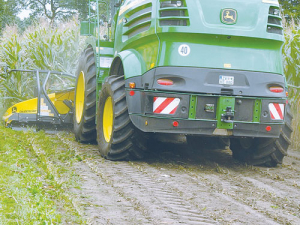Forage maize remains the crop most favoured for feeding cattle in Europe, but over the last 15 years, particularly in Germany, the maize worm or corn borer has become a major pest.
Ostrinia nubilalis feeds on leaves and tassels before moving onto stalks and ears, hindering yield and quality.
The main method of control is mechanical: ploughing to a depth of 40cm to kill larvae, and also mulching maize stubble immediately after harvest to remove debris which gives the pest a home to overwinter.
Unfortunately, about 30% of stubble is flattened by the tyres of self-propelled foragers and haulage equipment, so in many cases mulching quality can leave a lot to be desired.
Recently showcased by Kemper in the run-up to Agritechnica, the Stalkbuster has won a gold medal for innovation at the event.
Mounted immediately behind the header of a SPFH, the wear-resistant spinning flails chop and crush stubble to eliminate the borer habitat, before the harvester wheels pass over them. The technique has less risk of fusarium occurring, which in turn reduces the need for post-harvest chemical application.
An eight-row unit weighs about 500kg and requires 35hp to operate. It is mounted so as to achieve optimal ground following by way of a floating gearbox and an additional pneumatic pressure control system to track changing contours.
Kemper, owned by John Deere, claims the Stalkbuster, which makes for easier post-harvest cultivation, can also save farmers Euro 84/ha versus conventional mulching.
Also awarded an Agritechnica silver medal is John Deere’s EZ Ballast Wheel System, designed to make the task of ballasting for task specific operations much easier. Front and rear wheel weight packs are said to be fitted or removed in under five minutes by one person.
The sculpted packages are lifted with a forkhoist or telehandler onto the wheel centre and locked with a unique toggle system; they allow an extra 250kg at each front wheel and up to 500kg at each rear unit (2 x 250kg), giving a total ballast capability of 1500kg.


















